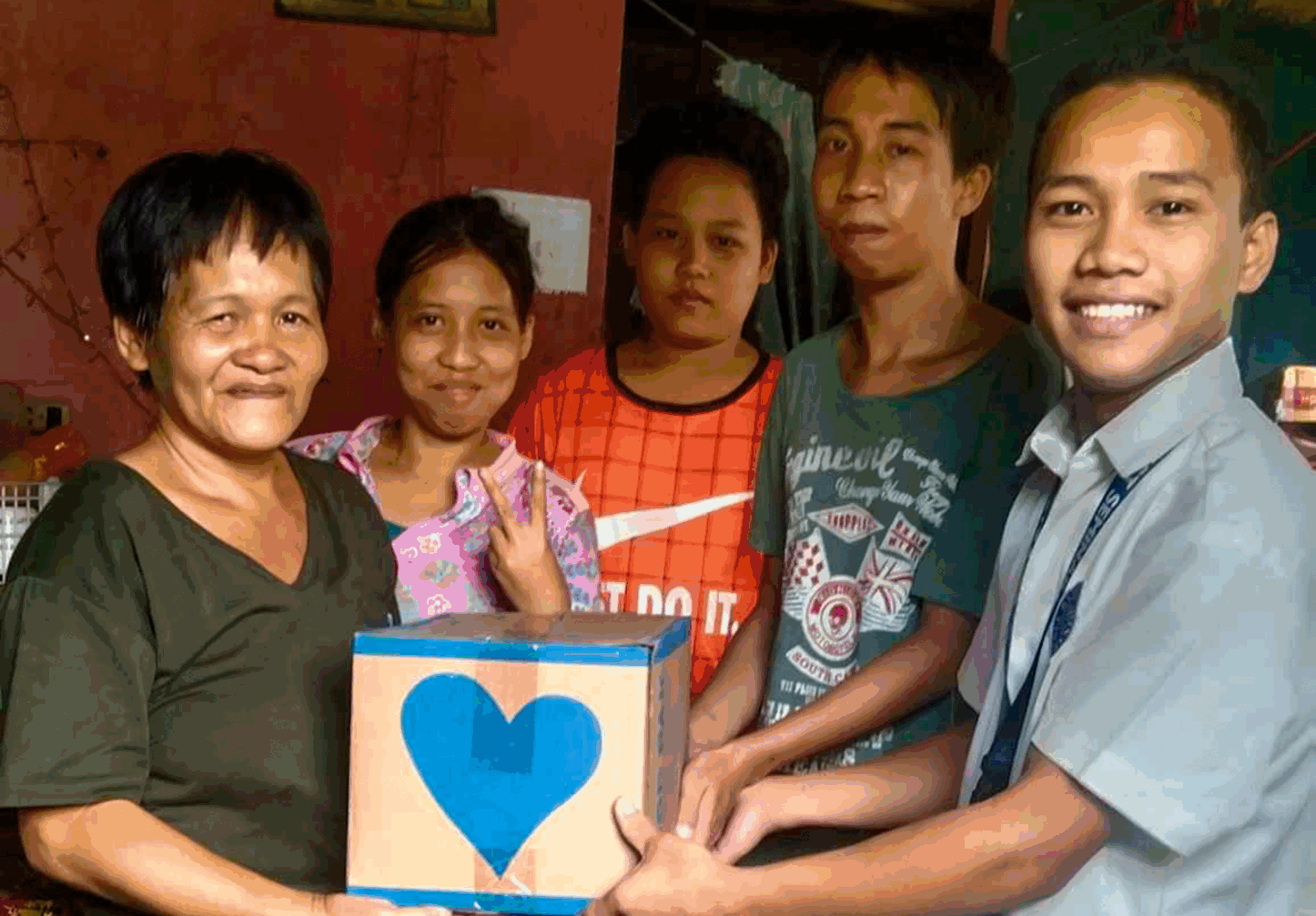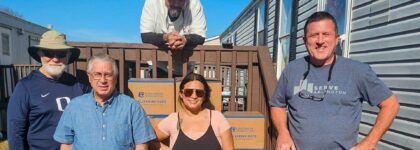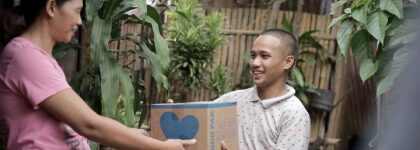Celebrate eight years of Fielder Church volunteers delivering Food Paks in Texas, sharing the gospel, praying by name, and bringing Christ-centered hope to children and families in need.
The Philippines
As Arjun Blaza carries a Food Pak up to the door of the Ocampo home, he sees some familiar signs. Poverty leaves a distinct mark on a community, and Arjun is no stranger to its impact.
He delivers a Food Pak to Maricel, a single mother of three children aged 14, 16, and 17. Her oldest son is the same age as Arjun himself.
The Ocampos live in a densely populated, impoverished neighborhood in Bacolod City, Philippines. Many residents are unemployed. Maricel is blessed to have employment as a seamstress, but she still struggles to provide regular meals for her children. Arjun shared with us,
Because of the Food Paks, we had the opportunity to enter into their lives and share the word of God with them. Because of this, we saw hope in Maricel’s eyes. She became hopeful, knowing that there are people who are willing to help them.
Arjun knows firsthand the importance of this hope. He was also once a Food Pak recipient.
Children’s Hunger Fund launched a network of churches in Bacolod City, on the Island of Negros, in the Philippines in 2018. Arjun was just ten years old at the time. He began receiving Food Paks as a boy and came to faith in Christ through the gospel message that was shared with him. He decided early on that he wanted to become a pastor.
Today, Arjun is in his second year of seminary and on his way to achieving his dream.
“Through the Food Pak ministry,” he shared, “God impressed upon my heart to do more for His honor and glory and to reach more souls for Christ.”
Armenia
In Armenia, Varuj of Bethel Church faces a similar situation as he unloads food from the back of his car to deliver to a family living in a container house.
The Markosyan family consists of two parents—Henrik and Zoya—and three children aged four, five, and thirteen. They live in a repurposed shipping container with two rooms. The container lacks proper heating, a real problem in the frigid winter months. Their bathroom and toilet facilities are also located outside.
Varuj was drawn to serve families in this community because he, too, lived in a container house for five years.
There are other families still living in container houses in our neighborhood. My motivation stems from a desire to share the gospel with those in our community and bring the message of hope to their lives.
Making matters worse for the Markosyan family, Henrik suffers from a leg injury that affects his mobility. Although he has a metal implant in his leg, walking is difficult. To alleviate their financial strain, Zoya is left with the responsibility of finding employment.
Despite their struggles, Varuj has felt genuine warmth and hospitality from the Markosyan family, making it clear that his visits mean more to them than simply providing food.
“We’ve earned their trust,” Varuj shared, “which is incredibly valuable. Trust fosters belief in a person’s words and solidifies bonds, making us feel like an integral part of their family. Despite our insistence against inconveniencing them, they always invite us for coffee and tea. Like family members, they want to share what they have with us.”
Myanmar
In a remote village in northern Myanmar, Pastor Ko Htut Ye delivers food to a family neglected by their community. For many years, Thawda Yu Tun has been struggling to feed her four children, aged five, eight, thirteen, and sixteen. Her husband has struggled with mental health issues, which has led others in their village to shun them.
To complicate matters, the village where Thawda Yu Tun and her family live is shelled occasionally due to the ongoing civil war in the country. Pastor Ko Htut Ye, once a refugee himself, desires to relieve some of the suffering he sees in this area.
Being able to meet these needs has greatly strengthened my faith. It is a pleasure to be able to see God’s global body at work and to benefit those here who have no hope.
When he first visited the family, they refused to let him enter; they had very little positive interaction with the community and were distrustful of strangers.
Ko Htut Ye refused to give up and kept visiting them. When they finally let him in, he tried to share the gospel, but they refused to listen. The family was both Buddhist and animist and was not ready to hear what he had to say.
Over four months, Pastor Ko Htut Ye continued to visit with the family. During that time, he became their friend, met their physical needs with the food he brought, and finally shared the gospel with them.
Each of these stories shares one crucial factor: these ministry volunteers have a personal connection to the people they serve. They know what it’s like to walk in their footsteps and have suffered similarly. They can use that shared experience to form bonds with those they serve. Arjun, Varuj, and Ko Htut Ye have all answered Jesus’ call to love their neighbors as themselves (Matthew 22:39) and to go and make disciples of all nations (Matthew 28:18-20), and they have done it in a way that allows them to serve people with their whole hearts.
We are grateful for every volunteer and pastor who gives of themselves each time they deliver a Food Pak, because they do so much more than drop off food. These desperately needed meals are the key to forming a relationship with a family that might otherwise never happen. This relationship is where the real beauty of the ministry happens. Because of this relationship, trust is formed and the gospel is shared.
Every volunteer that Children’s Hunger Fund works with has their own “why”, and each one is beautiful. The apostle Paul wrote it best when he said, “How beautiful are the feet of those who preach the good news!” (Romans 10:15b); we couldn’t agree more.
The recipients’ names have been changed to protect their privacy, and the Myanmar pastor’s name has been changed for his safety.



